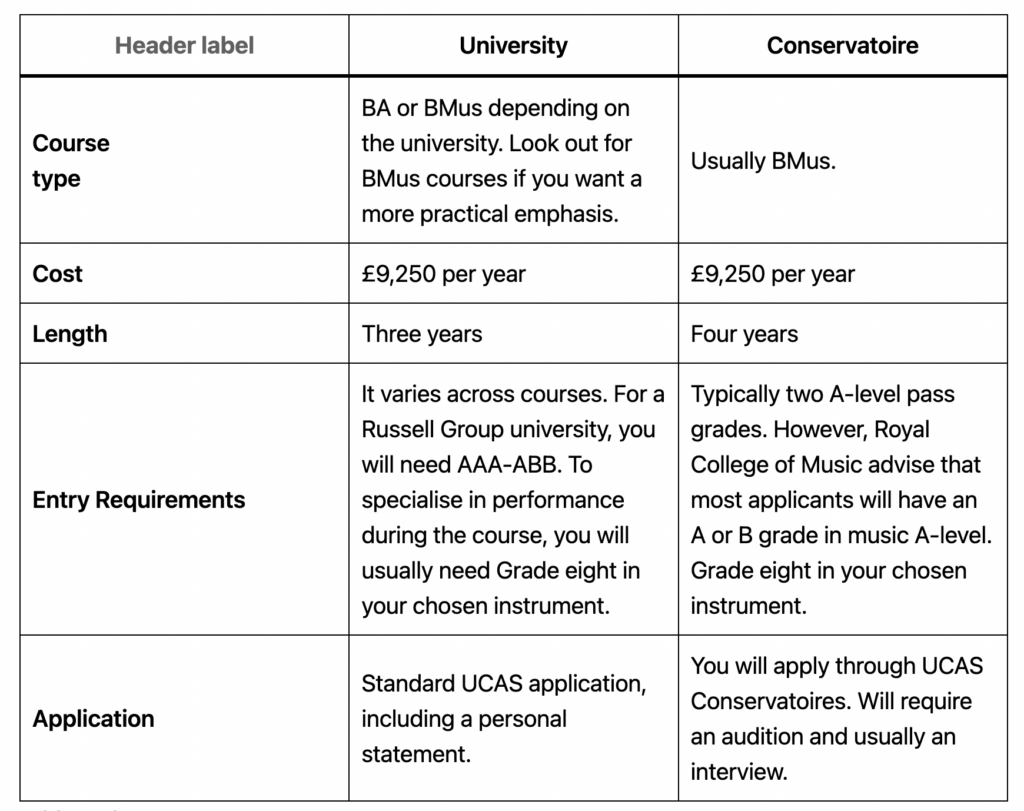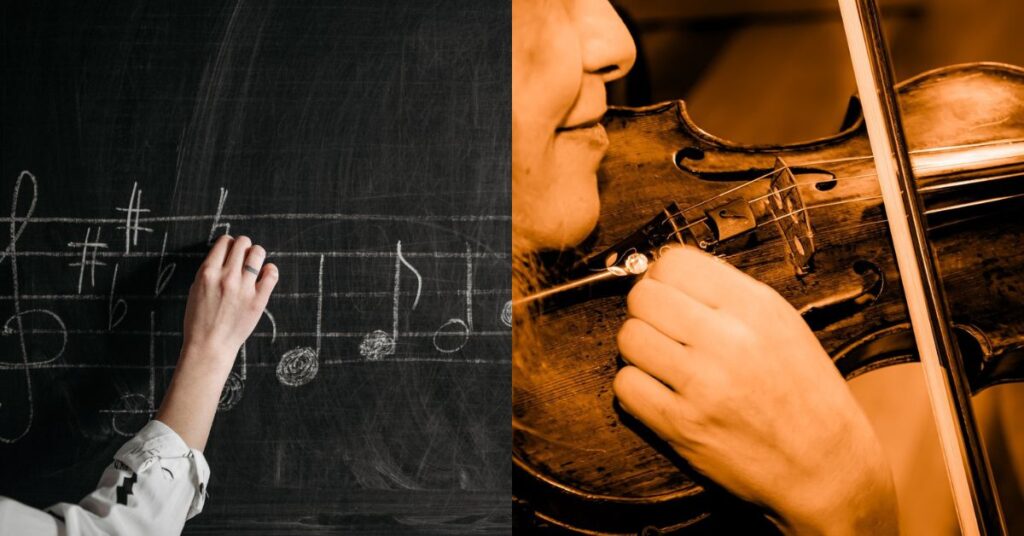What will you study?
Performance skills are undoubtedly the central focus of a conservatoire degree. Dr Anthony Gritten, head of undergraduate programmes at the Royal Academy of Music, says that the course will involve “a range of practical activities, ranging from solo tasks to ensemble work” and “immersion in professional music-making contexts alongside professional musicians”.
Anna Thirkettle, a current student at the Royal Birmingham Conservatoire, says, “we have some academic work, but the majority of it is performance.” She says that this doesn’t suit everyone: “I knew someone who changed courses to do a music degree in second year, because she just wasn’t passionate enough about the performance.”
In Thirkettle’s experience, the small amount of academic work at a conservatoire is entirely directed towards enhancing performance skills. She says that her essays in first and second year involved writing about performing in a historically informed way. At Birmingham, they also study pedagogy (how to teach), as well as harmony and aural skills.
Read: Five ways to boost your income as a classical music student
Read: A career without borders: your guide to moving abroad
Read more advice and practical tips here
If you would like more flexibility in choosing what you study, university might be the way to go. Dr Aine Sheil, co-head of the School of Arts at the University of York, says, “UK students are unusually fortunate in having university music departments where music-making is pursued to a very high level.” She points to “the integration of practice and theory that a university can provide.”
Carolyn Leung, who is studying for a bachelor’s in music at Durham University, says that a university degree is much more versatile. ”It really depends on what modules you choose,” she says. The course at Durham is very academic, but it can be tailored towards practical skills with the option to choose modules in composition, performance, conducting or orchestration. There are other universities with a much more practical emphasis, so make sure you research the course breakdown before deciding.
What is an average week like?
Thirkettle says that at a conservatoire, no two weeks are the same. “I couldn’t give you a timetable,” she says. “It is probably 20 contact hours, but it could be 30.”
If it is an orchestra project week, there will be rehearsals from 10am to 5pm most days, on top of everything else. They usually have a few academic lectures and seminars, as well as masterclasses, an hour-long individual instrument lesson, group instrument classes and workshops with visiting musicians.
It’s not a social thing to go and practice for hours a day. You have to be passionate about it and want to
Anna Thirkettle, Royal Birmingham Conservatoire student
Thirkettle is keen to emphasise that you have to be willing to put in the hours. “You’re alone by yourself doing that, it’s not a social thing to go and practice for hours a day,” she says. “You have to be passionate about it and want to.” She says a lot of the classes are optional, but you need to care enough about performance to choose to go and get the most out of it.
At university, the majority of your time will be self-directed. “For most of my modules it’s one hour per week of lectures and the rest of it is just self-studying,” says Leung. “It’s a lot of doing independent research, doing your own compositions.”
Leung says that towards the end of the year, deadlines start to pile up. “You have to be able to plan your own time really well,” she says. “Especially since you only have one contact hour per module for each week, the rest of the time you really need to push yourself to do work for the module.”
How is the social life?
At a conservatoire, there is a small, close-knit community, according to Thirkettle. “I could probably name most people in the year, everyone’s around all the time,” she says. “It is a smaller social bubble.”
She says that this makes it easy to settle in when first starting. “You don’t have to go out of your way to meet up with people because you’re always with each other and you have a common interest.” Thirkettle says that classes are very social in themselves: “It’s not just like listening to a lecture and then going home, it’s doing ensembles together and things like that.”
However, there are drawbacks. “It’s not a nine-to-five thing. We can have classes until seven, eight, nine at night, so there’s not really time to do societies to be honest because they’re just not within the schedule.”
One of the best things is getting to know a lot of other students from different courses as well and broadening your connections and relationships
Carolyn Leung, Durham University music student
In contrast, at university, you will have a lot more freedom to get involved in activities outside of your course. Leung says at Durham there is a strong music community. “Music students tend to see each other during other ensembles, like choirs or orchestra,” she says. “There are different orchestras, audition or non-audition, and a lot of a capellas and keyboard societies.”
Leung herself got involved in theatre outside of her degree, an opportunity she may not have had at a conservatoire. “I wanted to do a university degree because one of the best things is getting to know a lot of other students from different courses as well and broadening your connections and relationships,” she says.
So which should you choose?
Your decision really comes down to one key difference. “The main thing is that the conservatoire course is focused on a career at the end of it,” says Thirkettle. “Every class and every orchestra is experience for working afterwards.”
If you are set on a career as a performer, there is no better place to be. Professor Nicholas Reyland, head of undergraduate programmes at the Royal Northern College of Music, says at a conservatoire “students enjoy cutting-edge training for the music profession and a wealth of performance opportunities far beyond the reach of most universities.”
However, if you are less certain about your long-term career path, university may be a choice more suited for you. Leung says it is harder to focus on a specific area of music, but that university allows for room to explore a broader range of options. “Even if you do want to do composition, you will also have to do five other modules,” she says.
It is best not to put too much weight on which institution you go to, as the two are becoming more and more similar. “There is no black and white separation between the two types of institution, just different emphases,” says Gritten. Either way, you will receive a wealth of opportunities to grow as a musician.


